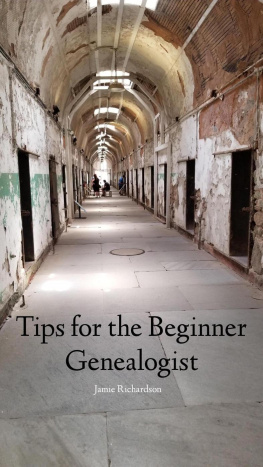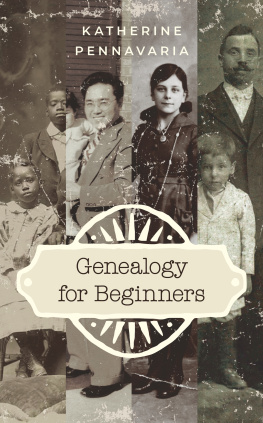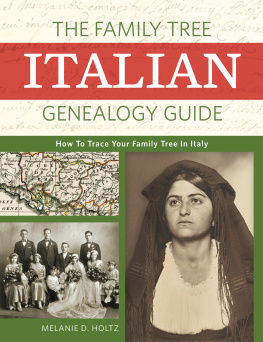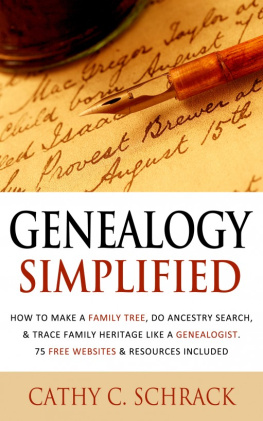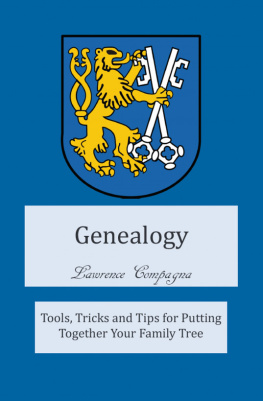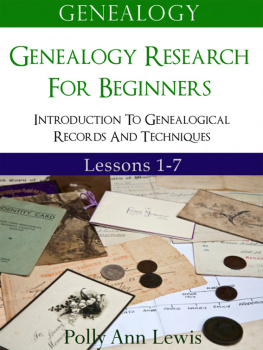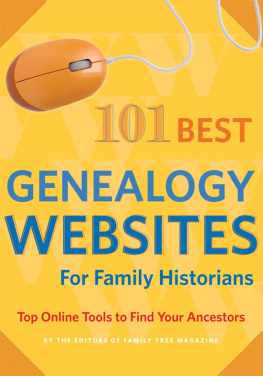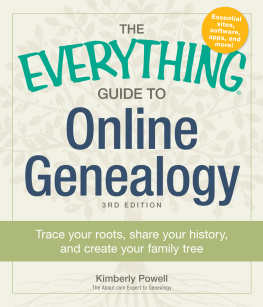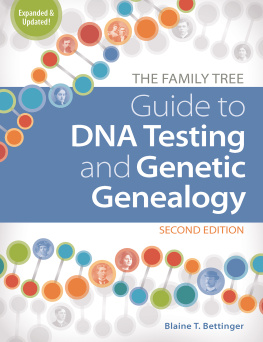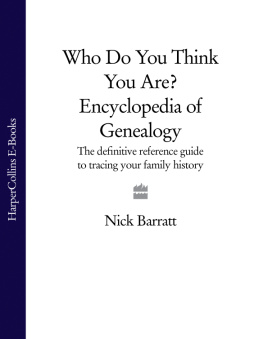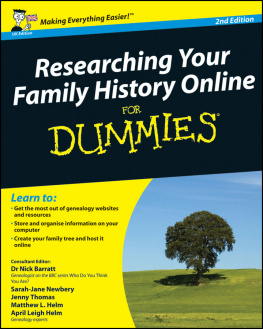Jamie Richardson - Tips for the Beginner Genealogist
Here you can read online Jamie Richardson - Tips for the Beginner Genealogist full text of the book (entire story) in english for free. Download pdf and epub, get meaning, cover and reviews about this ebook. year: 2021, publisher: Jamie Richardson, genre: Home and family. Description of the work, (preface) as well as reviews are available. Best literature library LitArk.com created for fans of good reading and offers a wide selection of genres:
Romance novel
Science fiction
Adventure
Detective
Science
History
Home and family
Prose
Art
Politics
Computer
Non-fiction
Religion
Business
Children
Humor
Choose a favorite category and find really read worthwhile books. Enjoy immersion in the world of imagination, feel the emotions of the characters or learn something new for yourself, make an fascinating discovery.
- Book:Tips for the Beginner Genealogist
- Author:
- Publisher:Jamie Richardson
- Genre:
- Year:2021
- Rating:5 / 5
- Favourites:Add to favourites
- Your mark:
- 100
- 1
- 2
- 3
- 4
- 5
Tips for the Beginner Genealogist: summary, description and annotation
We offer to read an annotation, description, summary or preface (depends on what the author of the book "Tips for the Beginner Genealogist" wrote himself). If you haven't found the necessary information about the book — write in the comments, we will try to find it.
When beginning research on your family tree, it can be overwhelming. This takes away some of that anxiety by providing tips and tools to assist the genealogy beginner. This is a roadmap to help begin your journey and help you navigate obstacles that you may encounter along the way.
Tips for the Beginner Genealogist — read online for free the complete book (whole text) full work
Below is the text of the book, divided by pages. System saving the place of the last page read, allows you to conveniently read the book "Tips for the Beginner Genealogist" online for free, without having to search again every time where you left off. Put a bookmark, and you can go to the page where you finished reading at any time.
Font size:
Interval:
Bookmark:
Tips for the Beginner Genealogist
Jamie Richardson
Published by Jamie Richardson, 2021.
While every precaution has been taken in the preparation of this book, the publisher assumes no responsibility for errors or omissions, or for damages resulting from the use of the information contained herein.
TIPS FOR THE BEGINNER GENEALOGIST
First edition. March 20, 2021.
Copyright 2021 Jamie Richardson.
Written by Jamie Richardson.
10 9 8 7 6 5 4 3 2 1
When I started on my genealogical journey more than fifteen years ago, I had no idea where to start. I knew that I wanted to know more about who and where I came from, but aside from a couple of websites, there was really no compass showing me which direction to go. I was fortunate to have a small collection of family stories to help facilitate the process. I also still had one living grandparent at the time, who was kind enough to answer so many questions that I had. Even if you are starting out with less information to go on than I was, it is still possible to find what you are looking for. The key is knowing where to start.
Go straight to the source. As I mentioned before, I was lucky to still have my grandmother living when I started out. Its great to learn facts and figures about your ancestors, but there is a great deal more to be learned from our loved ones. The relative does not need to be a grandparent. It could be a parent, cousin, aunt, uncle or family friend. It can be anyone that has a different perspective from yourself. Ask people if they have an anecdote or two to share. They may have experienced or heard about something that you never knew. These stories can also be a great jumping of point to further your research. You may hear mention of a residence, town, or even another person who figures into the story that you can use for your next topic of research. When you have a place and a timeframe, you can search local directories online and newspaper archives using the keywords you now possess. I was eventually able to tell my grandmother things that she didnt know with details from my searches. It was great pleasure to me to be able to tell my ancestors stories in a way that brings them to life. If there are personal stories that can be interlaced with your discovered facts, it makes a more interesting format for future generations to experience. Adding your own personal stories is not to be forgotten either. Remember that someday, one of your great grandchildren might ask his or her parents about you. This gives you the unique opportunity to tell your own story as you live it. Living through a global pandemic, an uneasy election, and many other significant events will be in the history books one day. Rather than becoming a footnote in your family history, you become the narrator. I had an ancestor who lived a long life, but passed during the 1918 Spanish Influenza pandemic. I have often wondered what it must have been like to have lived through something so terrifying without the benefit of 24 -hour cable news and colossal advancements in medicine. What steps did they take to keep themselves safe and why did those steps eventually not work? Telling a story through your own personal lens is a story worthy of your heirs. Your opinions and thoughts are what make the story interesting. Unless your ancestors kept diaries or journals, it is purely guesswork to surmise what they felt about the events that impacted their lives. I find myself adding to my own story when a new big event unfolds in my life or in the world as a whole.
Another valuable research tool is a photograph. Do you have photos of your parents as children? How about your grandparents or great-grandparents? In my experience, it seems that the eldest child in the family generally is the keeper of the family photos and albums. My grandmother was the eldest of three children and she had an absolute treasure trove of photos stored in an old, floral suitcase that she kept in the back of a closet. The photos spanned a timeframe of more than 100 years! I found photos of myself as a child, but digging much deeper, I found a photo with my 3rd great grandfather, his son, my 2nd great grandfather, his daughter, my great grandmother, and her daughter, my grandmother. What a score! The photo was taken in a small town not too far from where I live now, so I decided to stage a reenactment of this classic photograph. I had my grandmother, my mother, myself, and my three children pose in front of the same wall in that town. I hope future generations will get a kick out of this and maybe find some inspiration to recreate it yet again. A photograph is one of my favorite discoveries when doing this research. You will find that when researching an ancestor, you start to envision what he or she may have looked like and then finding a photograph of that ancestor allows you to see how close or far off you may have been.
Ask everyone in the family or close family friends if they have photos for you too look at and make copies if you find something you can use. Very rarely will one person have everything you need, that is why it is so important to make the rounds when seeking new information. Most people enjoy the opportunity to stroll down memory lane, so you may get some stories along with the photos. I have found that its best to be tactful when inquiring about an early death or family tragedy. Its best to tread lightly and be sensitive in what questions you ask and the way that you phrase them. What is a story to you, can be the memory of a very painful event in that persons life. It is important to not only know the good things, but the not so good, and outright awful as well. Both joys and sorrows contribute into making us the people we are.
Another great source for stories and photos is a relative, both close or distant, who shares your interest in genealogy. My great-grandmother and great-grandfather were divorced when my grandmother was a teenager. Her father was still in her life, but not to a great degree. She did not know very much about his childhood and some other parts of his life were unknown. My great-grandfather had a sister, and her grandson has been just such a source for me. He has been doing research for a couple of decades and his knowledge has proved invaluable to me. His grandmother was the eldest child and did not divorce, so she had all of the family record and photographs from the early part of the 20th century. At the time of her death, she had in her possession so many photos of herself and my great-grandfather as children. My grandmother had never seen any such photos, and was therefore very pleased when I showed them to her. She had not even seen one photo of her dad as a child and now there were dozens! This source and I connected through an online message board on Ancestry.com. I have also been able to connect to cousins several times removed in a similar manner. They were from different branches of my tree and knew details that I did not, and I provided them with details that were new to them. I cannot stress this enough. ANYONE who may have a story or family photo is worth asking. The oldest family photo I have is from the mid 1860s with my 4th great-grandfather and his wife and six children. Its a bit blurry and sepia toned, but it was taken during an incredibly tumultuous period of time in the United States. America was just coming out of a bloody civil war, a US president had just been assassinated, and here they were posing for a formal family portrait wearing their Sunday best. Its even more incredible looking at the photo in the context of what was happening in that time.
Say you want to interview a relative but you are uncertain where to begin. If you already have names and dates established on your tree, this is the time to get stories that will round out your research and add depth to your material. I like to start by having my relatives tell me about their childhood. Did they walk to school or take a bus? Was it a large school or a small one? Do they have any class pictures? Did they play any sports in school? Did they play an instrument? Were their parents strict or did they get away with everything? What physical and personality traits do they think they inherited from which parent? Do they have any amusing stories about pranks or fun times when they were growing up? What was the best family vacation ever taken? How did they choose their career path? Did they have any pets? You can also ask questions about some of the photos you may have. Where was this taken? Do they remember that day? I got a great story from my grandmother when I asked her about a phot with her and her sisters as teenagers. One of her sisters faces was scratched out and I wanted to know if this was deliberate or did the photo get damaged over time. My grandmother vividly remembered that she was the one who scratched out her sisters face because her sister kept borrowing her clothes without asking. I loved this story because it shows that sibling rivalry is nothing new and it made me feel a little better about some of the fights my brother and I had over the years. You can also ask that relative if there is anyone else that they can think of that might have more to share. Do not hesitate to ask while you are still able.
Font size:
Interval:
Bookmark:
Similar books «Tips for the Beginner Genealogist»
Look at similar books to Tips for the Beginner Genealogist. We have selected literature similar in name and meaning in the hope of providing readers with more options to find new, interesting, not yet read works.
Discussion, reviews of the book Tips for the Beginner Genealogist and just readers' own opinions. Leave your comments, write what you think about the work, its meaning or the main characters. Specify what exactly you liked and what you didn't like, and why you think so.

